Tom Dunn explains how machinery choice and maintenance can help smaller contracting businesses make the most of their equipment.
How do you get the most from your floor preparation equipment purchase? Construction is one of the largest economies in the world. When you think of this sector, you may picture huge corporations on large-scale developments, but in reality UK government data suggests most contractors are self-employed or work for a small business. Competing for jobs requires these contractors to offer the best service at the best price, so every purchase they make must provide return on investment (ROI).
Here I’ll explain how machinery choice and maintenance can help smaller contracting businesses make the most of their equipment.
Before knowing how to get a good ROI, contractors must first choose how they will invest. In floor preparation, to gain access to the best equipment for the application, contractors will typically choose to rent or purchase. Both options provide a range of benefits, so which gives contractors the most for their money?
What’s the job?
Effective floor preparation requires the right combination of tools – a mechanic wouldn’t turn up to a job with one wrench, so contractors shouldn’t expect every job to require the same equipment.
Before starting a new job, contractors should visit the site, understand customers’ expectations, look at existing flooring and determine the budget and job deadline to select the right machinery. For example, a smaller residential space on an upper floor with soft coverings, such as carpet, requires different machinery to a large, industrial space that needs polished concrete.
If the next job requires a machine that isn’t already in the contractor’s arsenal, they must purchase or rent machinery to take on the project. When deciding which option is best, contractors should consider how often this application may occur for them in the future, whether the machine will increase their capabilities and if they are confident operating it.
For example, if a company that normally works on small projects has the opportunity to work on a one-off, large-scale application that requires a larger floor scraper, renting will probably be the better option. If, in the future, that same contractor wants to bid for larger jobs, investing in the equipment shows potential customers that they have the equipment to do the work effectively.
Efficient operations
Once on site, maintaining uptime is vital to staying within budgets and timelines and reducing any unplanned costs for the contractor. Having the right tools on site, such as blades for scrapers or diamond tooling for grinders, reduces machine downtime. If contractors aren’t aware of the best tools for the application, having a few options available means they can quickly find the right combination to do the job effectively.
When scraping floors, blades will dull over time – having spares is important but there are also ways to make blades last longer. Some blades, such as National Flooring Equipment’s flat blades, are designed to be used on both sides so they can be used for as long as possible.
Extra costs
Equipment won’t be in use all the time, so contractors must consider anything else involved with total cost of ownership (TCO). This includes factors such as transportation, equipment storage and maintenance. A distributor often takes responsibility for transportation and storage, so renting could reduce costs. However, because the equipment is available to any of the distributor’s customers, there is no guarantee that it’ll always be available.
Proactive maintenance, whether renting or buying, can also extend the lifespan of the machine. Regular cleaning, checking core components and seeking the advice of the distributor or manufacturer when issues occur will ensure the machine lasts.
When operating a small business, every penny counts. Having the right equipment on hand is vital to helping smaller contracting companies bid for different floor preparation projects. By understanding when it’s best to purchase or rent and ensuring efficiency when on- and offsite, contractors can get the most value from their surface preparation equipment.
For advice on choosing the right floor preparation equipment for your next job and to find out how you can get return on your investment, please contact us.
www.nationalequipmentdirect.com
Tom Dunn is director of sales at National Flooring Equipment


